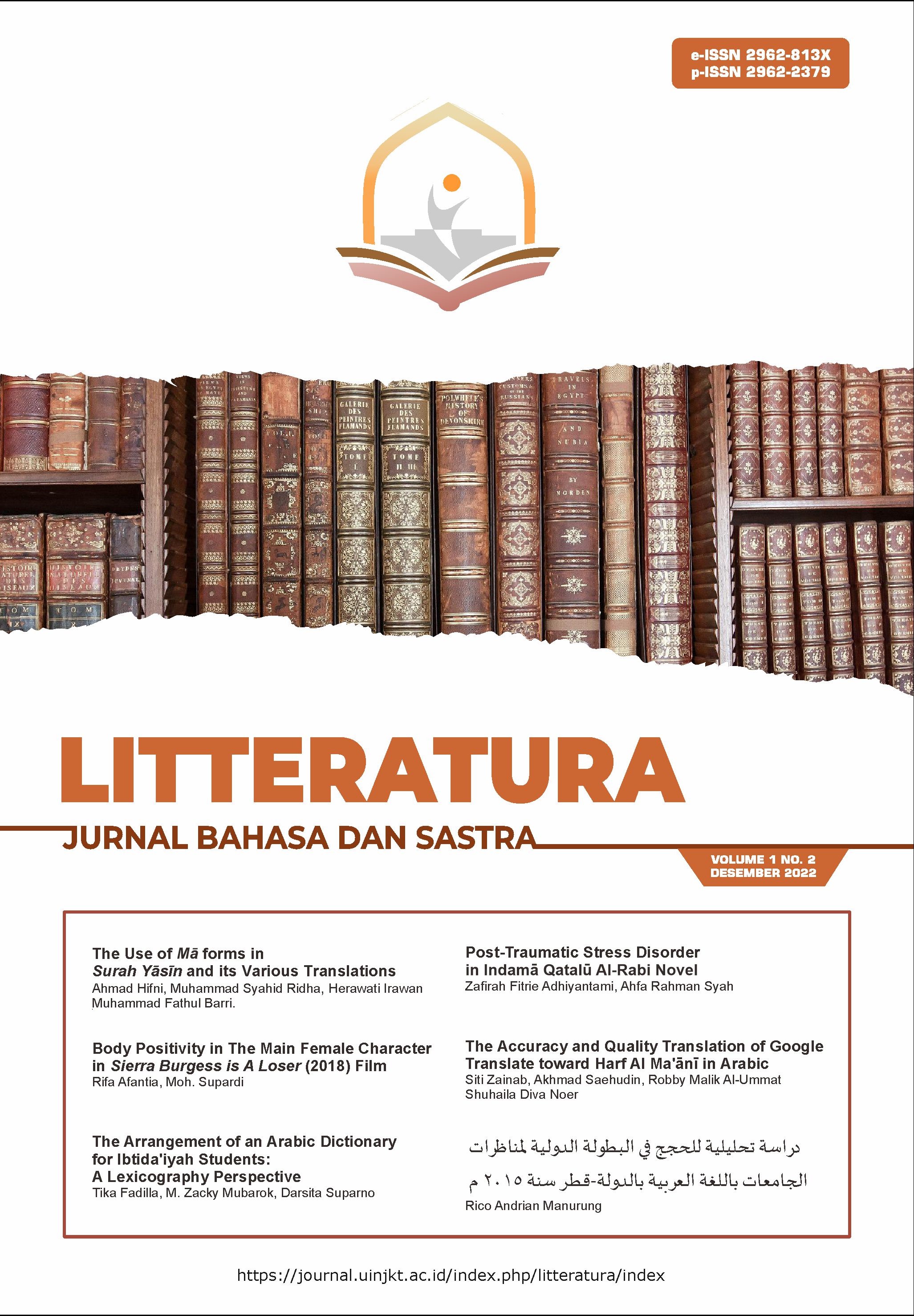Post-Traumatic Stress Disorder in Indamā Qatalū Al-Rabi Novel
DOI:
https://doi.org/10.15408/ltr.v1i2.29028Keywords:
Traumatic Experiences, Post Traumatic Stress Disorder, Main Character, 'Indamā Qatalū Al-rabi'Abstract
This study analyzes Post-Traumatic Stress Disorder (PTSD) in the main character Bella in the Indamā Qatalū al-Rabi novel by Hiba Jamal As'ad. This research departs from the central issue of this novel, which is about situations of war, crime, and the oppression that befalls the main character Bella, which negatively impacts her psyche. This study applies a descriptive analysis method using PTSD theory which refers to the Diagnostic of Mental Disorders DSM V (Diagnostic and Statistical Manual of Mental Disorders Fifth Edition) by APA (American Psychiatric Association) to reveal personality, trauma, symptoms, and efforts to suppress PTSD disorders Bella character. The results show that Bella, who initially had positive characteristics such as being sociable and cheerful, transformed into a mentally and psychologically disturbed person due to her experiences of severe trauma such as the murder of her parents, rape, harassment, threats to spreading immoral videos, and some physical and mental violence. All of these experiences created PTSD disorders in Bella with symptoms of sleep disturbances, avoidance of certain situations and moments, and loss of the ability to feel emotional feelings or positive emotions. At the end of the story, Bella's marriage to Hassan becomes an important event and stimulus for Bella to reduce the stress and trauma.
References
Bisson, J. L. (2013). What Happened to harmonization of PTSD diagnosis? The divergence of ICD II and DSM5. Epidemiology and Psychiatric Science. 2013
Dirgayunita, A. (2016). Gangguan Stres Pasca Trauma Pada Korban Pelecehan Seksual dan Pemerkosaan. Vol.1.
Jeste, Dilip, V. et al. (2013). Diagnostic and Statistical Manual of Mental Disorder Edition (DSM-V). American Psychiatric Publishing.
Moughalian, Catherine & Yasmine, R. (2016). Systemic violence against Syrian refugee women and the myth of effective intrapersonal interventions. Reproductive Health Matters: An international journal on sexual and reproductive health and rights. https://doi.org/10.1016/j.rhm.2016.04.008
Muhammad, Amiroh. (2017). The impact of Post Traumatic Stress disorder on some menta disorders to the population of Riyadh, Saudi Arab. IUG Journal of Educational and Psychology Sciences (Islamic University of Gaza). Vol 25, No 4, 2017, pp 34 -60
Kakaje, Ameer. et al. (2021). Mental disorder and PTSD in Syria during wartime: a nationwide crisis. Jurnal BMC Psychiatry. https://doi.org/10.1186/s12888 020-03002-3
Kakaje, Ameer. et al. (2020). Post-traumatic stress disorder (PTSD), anger and mental health of school students in Syria after nine years of conflict: a large-scale
school-based study. Jurnal Psychological Medicine. Cambridge University Press. https://doi.org/10.1017/S0033291720003761
Sadock, B. J. & Sadock V. A. (2005). COMPREHENSIVE TEXTBOOK OF PSYCHIATRY VOLUME II Eight Edition. Philadelpia: Lippincott Williams & Wilkins
Weaver. (2003). Counseling Survivor of Traumatic Events; A Handbook For Pastors And Other Helping Professional . Abingdon Press.


